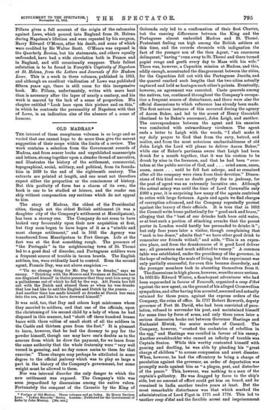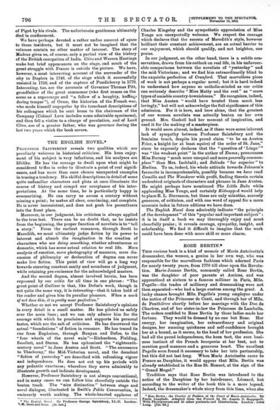OLD MADRAS.* THE interest of these sumptuous volumes is so
large and so varied that one cannot hope to do more than give the merest suggestion of their scope within the limits of a review. The work contains a selection from the Government records of Madras, and from scarce books and unpublished manuscripts
and letters, strung together upon a slender thread of narrative, and illustrates the history of the settlement, commercial, topographical, social, military, and political, from its founda- tion in 1639 to the end of the eighteenth century. The extracts are printed at length, and one must not therefore expect either the proportion or the conciseness of history. But this prolixity of form has a charm of its own; the book is one to be studied at leisure, and the reader can skip without compunction any sections which do not appeal to him.
The story of Madras, the oldest of the Presidential cities, though not the oldest British settlement (it was a daughter city of the Company's settlement at Masulipatam), has been a stormy one. The Company do not seem to have looked very favourably upon their new acquisition at first,
but they soon began to have hopes of it as a "nimble and most cheape settlement," and in 1641 the Agency was
transferred from Masulipatam to Fort George. Life at the fort was at the first something rough. The presence of "the Portugals " in the neighbouring town of St. Thome led to a good deal of disorder, and Portuguese soldiers were a frequent source of trouble in tavern brawls. The English settlers, too, were evidently hard to control. Even the second agent, Francis Day, was not above suspicion :—
"'Tis no strange thing for Mr. Day to be drunke," says an enemy. "Drinking with the Moores and Persians at Ballisara hee soe disguised himself in theire presence that they sent him away in a pallankeene out of which he fell by the way. Att Persia hee fell out with the Dutch and abused them so when he was drunke that bee had like to sett the English and Dutch by the yeares.. . . And another time hee made himself so drunke at Persia hee rann into the sea, and like to have drowned himself."
it was said, too, that Day and others kept mistresses whom
they married to soldiers, and that one of the officials, upon the christening of his second child by a lady of whom he had disposed in this manner, had "shott off three hundred brasse bases with three volliea of small shott of all the soldiers in the Castle and thirteen guns from the fort." It is pleasant to learn, however, that he had the decency to pay for the powder himself, though one may have one's doubts as to the sources from which he drew the payment, for we learn from the same authority that the whole fraternity were " very well versed in gameing, and no day comes amiss to them for that exercise." These charges may perhaps be attributed in some degree to the official jealousy which was to play so large a part in the history of the Company's government, but some weight mast be allowed to them.
Nor was internal disorder the only danger to which the new settlement was exposed. The Company's title was soon jeopardized by dissensions among the native rulers.
Fortunately the conquest of the Carnatic by the King of
* Vestiges of Old Madras. Three volumes and an Index. By Henry Davison Love. "Indian Records" Series. London: Published for the Government of India by John Murray. [Ws. net.]
Golconda only led to a confirmation of their first Charter, but the ensuing differences between the King and the Portuguese almost embroiled Madras and St. Thome. Protestant feeling ran high among the British settlers at this time, and the records chronicle with indignation the fact of the younger son of the then Agent, "an enormous delinquent," having "rutin away to St. Thome and there turned papist rouge and goeth every day to Mass with his wife." There was, however, a Capuchin mission at Madras, and this, oddly enough, accentuated the disagreement between the cities, for the Capuchins fell out with the Portuguese Jesuits, and the quarrel reached such lengths that the two cities actually captured and held as hostages each other's priests. Eventually, however, an agreement was executed. Caste quarrels among the natives, too, continued throughout the Company's occupa- tion a frequent source of disturbance, and there were also the official dissensions to which reference has already been made. The first serious instance of this occurred during the agency of Aaron Baker, and led to the arrest of Henry Greenhill (destined to be Baker's successor), John Leigh, and another. The correspondence between the agent and his enemies was conducted with extraordinary virulence. The agent ends a letter to Leigh with the words, "I shall make it my daily prayer to God that from the envy, hatred, and malice, and from the most notorious uncharitableness of old John Leigh the Lord will please to deliver Aaron Baker," while one of Baker's partisans swore that Leigh had been drunk for a month together, that it was his custom to be drunk by nine in the forenoon, and that he had been "over- taken at the public service of God, and . . . cried amen, amen, amen, amen . . . until he fell fast asleepe, and so remained after all the company were risen from their devotion." Dissen- sions of this kind were no doubt partly due to jealousy, for the post of agent was an extremely lucrative one. Although the actual salary was until the time of Lord Cornwallis only £300 a year, it is surprising how many of the agents contrived to retire with large fortunes. Again and again we find charges of corruption advanced, and the Company repeatedly protest against the luxury of their officials. It is true that in 1652 the Council write home pathetically for " good sack and beare," alleging that the " best of our drincke hath been cold water, or at best such a portion of stincking arracke that the porest porter in London would hardly bee persuaded to drinke it "; but only four years later a visitor, though complaining that " sack is too deare," admits that " we have other good drink to remember our friends withall," and adds, " This is an expen- sive place, and from the drunkenness of it good Lord deliver me; all gamesters and much addicted to venery." A common table was established, under the presidency of the governor, in the hope of reducing the scale of living, but the experiment was only partially successful, for even this became disorderly, and the younger members took to absenting themselves from it.
The dissensions in high places, however, were the more serious. In 1665 Sir Edward Winter, a flamboyant adventurer who had been superseded in favour of Foxcroft, organized a coup d'etat against the new agent, on the ground of his alleged Cromwellian sympathies, and after having him arrested, assumed and actually retained for three years, against the express orders of the Company, the reins of office. In 1717 Robert Rowortb, deputy governor of Fort St. David, who had been convicted of pecu- lation, refused to surrender his post, and maintained himself for some time by force of arms, and only three years later a serious dissension broke out between Governor Hastings and Nathaniel Elwick, the senior member of Council. The Company, however, " crushed the cockatrice of rebellion in the egg," and Hastings was recalled in favour of his enemy. Another swashbuckler who caused an infinity of trouble was Captain Seaton. While this worthy contented himself with gaming and duelling, he was able by pleading his "great charge of children" to arouse compassion and avert disaster. When, however, be had the effrontery to bring a charge of peculation against the governor, an order of deportation was promptly made against him as " a plague, pest, and disturber of the peace." This, however, was nothing to a man of the captain's gallantry. He was dragged by force to the ship's aide, but no amount of effort could get him on board, and he remained in India another twelve years at least. But the most remarkable disturbance was that which marked the administration of Lord Pigot in 1775 and 1776. This led to another coup d'etat and the forcible arrest and imprisonment
of Pigot by his rivals. The unfortunate gentleman ultimately died in confinement.
We have perhaps devoted a rather undue amount of space to these incidents, but it must not be imagined that the volumes contain no other matter of interest. The story of Madras gives us, of course, only a partial view of the history of the British occupation of India. Clive and Warren Hastings make but brief appearances on the stage, and much of the great struggle with France is outside the picture. We have, however, a most interesting account of the surrender of the city to Dupleix in 1746, of the siege which it successfully resisted in 1758, and of the capture of Pondicherry in 1778. Interesting, too, are the accounts of Governor Thomas Pitt, grandfather of the great commoner (who first comes on the scene as a supercargo and "a fellow of a haughty, huffing, daring temper "), of Orme, the historian of the French war, who made himself unpopular by the trenchant descriptions of his colleagues which he sent home to the chairman of the Company (Colonel Love includes some admirable specimens), and then fell a victim to a charge of peculation, and of Lord Clive, son of a greater father, who was governor during the last two years which the book covers.































































 Previous page
Previous page